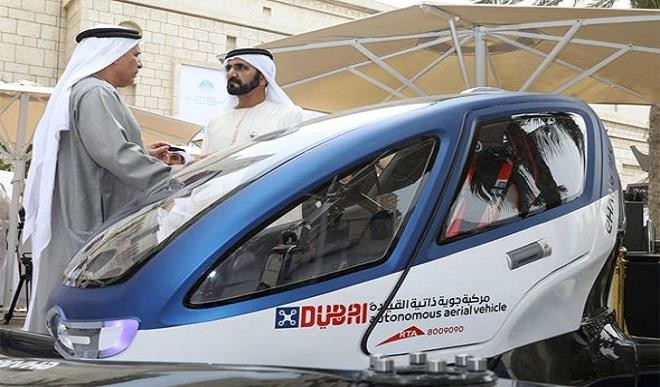
The future of mobility is up in the air – literally. This seems to be the case in Dubai, at least. In response to serious traffic congestion problems, the city will soon be the site of a five-year test launch for airborne taxis.
The aircraft to be used in the test come from Germany, marking a great success for young start-up Volocopter, especially since authorities in Dubai were originally planning on using a single-seat drone developed by the company Ehang in China.
Taking off and landing vertically, like a helicopter, is the name of the game – the classic dream of a flying car, now becoming a reality thanks to cutting-edge technologies. The model that will be used in Dubai has 18 small propellers arranged in a circle, and can carry two passengers.
Contrary to what was initially planned, the aircraft will have a pilot on board. Autonomous flying may eventually be possible, but depends "on how prepared the companies are and on the existence of a legal framework for autonomous aviation," explains Mattar al-Tayer, director of Dubai’s Roads and Traffic Authority (RTA).
Although there has been considerable worldwide competition for innovative transportation concepts, nowhere in the world has experience with extensive use of flight taxis in low-level airspace.
Despite high hopes that this will become a reality in the near future, there are some major obstacles to overcome, both technological and bureaucratic. And that’s without mentioning psychological hurdles – not least for pilots.
"I would never step into such an autonomous taxi," says Markus Wahl from German pilots’ association Vereinigung Cockpit. In particular, Wahl dreads the idea of a wireless malfunction, which would leave the passenger helpless in a rudderless aircraft.
Even so, there is still tremendous market potential in this field, with a dozen companies worldwide currently working on suitable technology, including Geely, Volvo’s Chinese parent company.
Geely has also taken over the US-based flying car manufacturer Terrafugia, which presented its first flying car a few years ago. The mobility service Uber has also expressed interest in modifying its car-based platform to accommodate air taxis from different manufacturers. Uber expects to start tests in Dubai and Dallas by 2020.
"In the last 12 months, the concept of ‘flying cars’ has finally become socially acceptable," says John Brown, the Australian project manager of the Munich-based company Carplane.
For its part, Volocopter recently announced that it will receive a cash injection of 25 million euros (29.5 million dollars) from Daimler, tech investor Lukasz Gadowski and other investors. The company wants to refine its technology and accelerate the introduction of production models.
Another German company, Lilium, received 10 million euros (11.8 million dollars) in financing from the London-based investor Atomico at the end of last year.
Even aircraft manufacturer Airbus has plans for the flying car market. The company is developing a driverless flying taxi, which will consist of a small cabin on runners with front and rear propellers.
The plan is for passengers to be able to order the flying cabs by smartphone, specifying their the pick-up location. According to current plans, the first prototype is scheduled to fly this year.
Most flying taxi prototypes have many small propellers instead of one large one, each powered by an electric motor. Their main weakness is the batteries, which tend to last no longer than 30 minutes.
The planned test phase in Dubai will be supervised by the RTA, as well as the Dubai Civil Aviation Authority (DCAA), with special take-off and landing sites set to be built across the city. Dubai, which is home to some 2 million people, hopes to shift a quarter of its traffic to autonomous vehicles by 2030. (DPA)

 Join Daily Trust WhatsApp Community For Quick Access To News and Happenings Around You.
Join Daily Trust WhatsApp Community For Quick Access To News and Happenings Around You.


